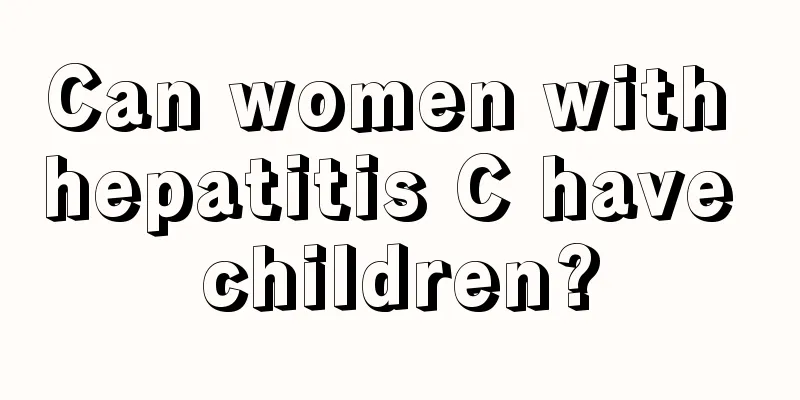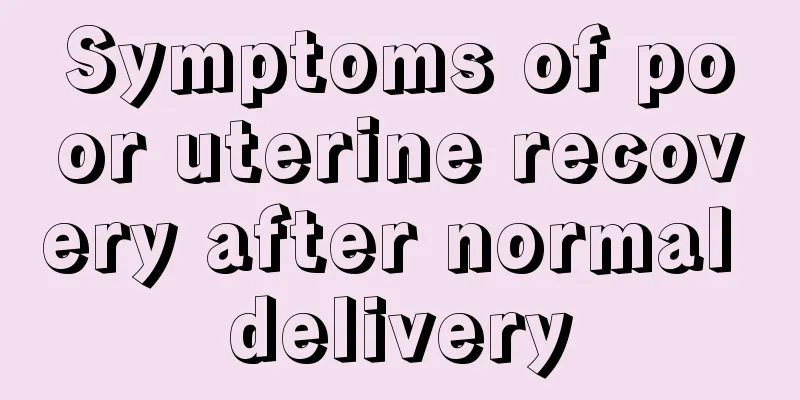Can women with hepatitis C have children?

|
Hepatitis C is a type of viral hepatitis. Like hepatitis B, hepatitis C is contagious. Many women are concerned about whether patients with hepatitis C can have children. It is possible to have children with hepatitis C, but it will affect the fetus. In this case, it is generally recommended to receive treatment first and then prepare for pregnancy. 1. Women with hepatitis C can have children, but because taking medication after pregnancy can have a serious impact on the fetus, it is recommended to receive treatment first and then consider pregnancy and childbirth. If a woman has hepatitis C, the hepatitis C virus will reside in her body for a long time, causing a certain degree of damage to the liver. Pregnancy itself will also increase the burden on the liver. In addition, she must be very cautious about taking medications during pregnancy. If a woman becomes pregnant when her condition is unstable, it will be extremely detrimental to her condition and liver. 2. Hepatitis C, like hepatitis B, is an infectious disease, one of which is mother-to-child transmission. It can also be transmitted through blood and sex. It is not a genetic disease. The chance of mother-to-child transmission of hepatitis C is low. If the hepatitis C RNA test is negative, it means that you are in a stable state and you can consider pregnancy. However, if the test result is anti-HCV positive, it is recommended to become pregnant and have a baby after hepatitis C is cured, which will be better for the health of both the mother and the baby. Regardless of your hepatitis C status, it is recommended that you get treatment first before getting pregnant. 3. If a woman with hepatitis C gives birth to a child, it is very likely that the hepatitis C virus will be transmitted to her offspring, affecting the health of the newborn. People with hepatitis C can have children, but for the sake of their offspring and their own health, it is best for hepatitis C patients to receive treatment before considering having children. If a mother with hepatitis C wants to know whether her newborn is infected with the hepatitis C virus, she can test the child for hepatitis C antibodies and hepatitis C virus load six months after the child is born. If both the antibodies and the virus load are positive, it most likely means that the child born to the mother with hepatitis C is infected with hepatitis C, otherwise, the child is not infected with the hepatitis C virus. |
<<: What causes irregular menstruation after sexual intercourse?
>>: What should I do if I catch a wind-heat cold during breastfeeding?
Recommend
The dangers of oxytocin injections
Pregnant women generally need to go to the hospit...
There are many small bumps on the labia
The vulva can be divided into two parts (labia ma...
Signs of good recovery of uterus after medical abortion
After becoming pregnant, women may be forced to a...
How to lose weight after giving birth
Generally, women during pregnancy eat a lot of nu...
What breast milk looks like under a microscope
After the child was one year old, some people aro...
How to adjust the implantation before transplantation
For women who are undergoing in vitro fertilizati...
Can gynecological inflammation be cured by rolling hot eggs?
Many women may suffer from gynecological inflamma...
Why is the pregnant woman feeling cold all over?
Many women will stay in confinement after giving ...
What is the reason for clear water in the nipples when I am six months pregnant?
Pregnant women need to do many things that are be...
Face slimming and weight loss exercises, 3 minutes of face slimming exercises to lose weight every day
Every woman wants to have an exquisite small V-fa...
There is a hard lump just below the belly button in women
The female body structure is very unique, especia...
What happens if a girl often stays up late
It is very common for women to stay up late. Wome...
The harm of poor uterine involution
If a woman does not pay attention to medical care...
What is the reason for dark menstruation
Dark menstrual blood sometimes appears in female ...
How to abort an unexpected pregnancy
Unexpected pregnancy is a phenomenon that many wo...









